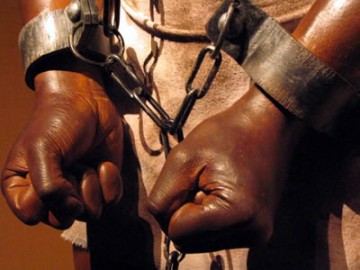A case study of Nigeria
By
Ajise Vincent
In the year 1442 the Portuguese started the transatlantic slave trade by taking solace along a settlement near the gulf of Guinea, now known as the present day Nigeria. There had already been slavery prior to the Portuguese invasion with men and women carted away following wars to become servants. These men and women were made to perform menial jobs of servitude for their conquerors.
On noticing such anomalies practiced by these primitives, the Portuguese decided to subsume their developmental blueprint into these practices so as to achieve economic prosperity. The Portuguese merchants exchanged items such as brass, copper and bracelets for products such as pepper, cloth, beads and even slaves. They used the slaves as labourers in coffee, tobacco, sugar and cotton plantations, in addition to utilising them as workers in gold and silver mines, rice fields and construction industries.
As a result of this obnoxious trade practiced by the Portuguese, tales of the evil venture’s profitability pervaded the European peninsula; England, France and other European countries also deciding to seek solace in the trade. The English added another perspective to the already set Portuguese ideas by offering mirrors and guns to the illiterate primitive rulers, traders and military aristocrats in exchange for slaves (especially strong ones as they previously used Indians for this self-beneficial commercial venture which turned out to unprofitable). This spurred the illiterate leaders to carry out raids to capture slaves, causing an increase in the cases of kidnapping.
Oluudah Equiano, an ex-slave described in his memoir published in 1789 how African rulers carried out raids to capture slaves:
“when a trader wants slaves, he applies to a chief for them and tempts him with his wares. It is not extraordinary if on this occasion he yields to the temptation with a little firmness and accepts the price of his fellow creature’s liberty with as little reluctance as the enlightened merchant. Accordingly he falls upon his neighbours,and a desperate battle ensues…if he prevails, he takes prisoners; he gratifies his avarice by selling them”
The slave trade, which began in 1442, was abolished by Britain in 1806. That’s close to 400 years of which generations upon generations were carted away to unknown destinations, never to return. Despite the abolition of slave trade by the British, the slave trade business still continued in many parts of Africa for a number of years. My great grand father told me:
“only eight persons and a dog survived in our village. All others were carted away as slaves even after the abolishment of the slave trade by the Brits”
Some schools of thought claim that about twenty million blacks were carted away to places like the West Indies, America, Belgium and Spain, until 1892 when colonialism came to the fore.
Could this gory image of black dehumanisation be the catalyst for the racial stigma rendered on blacks around the globe today? Could the past (mis)adventure of neighbours kidnapping neighbours be the reason for the great mistrust between Africans today?
Could the carting away of over twenty million strong individuals mean we are descendants of weaklings? Perhaps our ancestors were only left because they were weak and therefore we aren’t man enough to propel development?
Also, could the kidnapping of women by the dreaded Boko Haram group be a result of our kidnapping past, which the western world then encouraged?



No Comments Yet!
You can be first to comment this post!